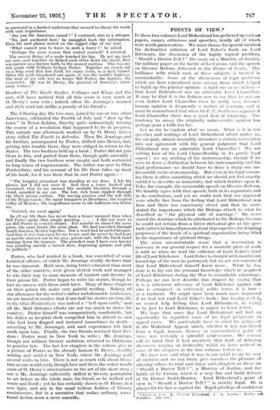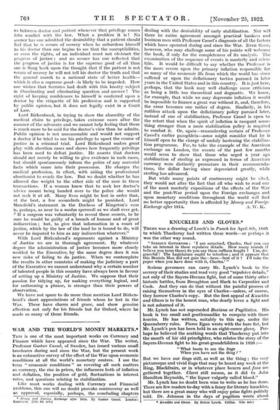POINTS OF VIEW.* Ix these two volumes Lord Birkenhead has
gathered up various papers, essays, criticisms and speeches, nearly all of which were worth preservation. We must choose for special mention the destructive criticism of Lord Esher's book on Lord Kitchener, the discussion of the highly topical problem, " Should a Doctor Tell ? " the essay on a Ministry of Justice, the military paper on the battle of Le Cateau, and the speech on Divorce Reform delivered in the House of Lords. The brilliance with which each of these subjects is treated is unmistakable. Some of the discussions of legal problems which are here reproduced were among those which helped to build up the popular opinion—a right one as we believe— that Lord Birkenhead was an admirable Lord Chancellor. It may be that it is the fashion now to say that lie was an even better Lord Chancellor than he really was, because human opinion is frequently a matter of reaction, and it must be remembered that when Sir F. E. Smith was appointed Lord Chancellor there was a good deal of misgiving. The tendency to unsay the originally unfavourable opinion has perhaps gone a trifle too far.
Let us try to explain what we mean. What is it in the speeches and writings of Lord Birkenhead which makes us, for our part, almost insensibly introduce a certain reservation into our agreement with the general judgment that Lord Birkenhead was an admirable Lord Chancellor ? We are writing here of his Lord Chancellorship in its purely legal aspect ; we say nothing of his statesmanship, though if we were to draw a distinction between his statesmanship and his legal performance we should have to draw a sharp one un- favourable to his statesmanship. But even in his legal reason- ing there is often something which we should not feel exactly entitled to describe as insincerity, but which borders upon it. Take, for example, the memorable speech on Divorce Reform. We heartily agree with that speech, both in its arguments and in its conclusions, and yet we could wish that our approval were wholly free from the feeling that Lord Birkenhead was here and there too consciously clever and that he over- stated the importance which the Bishops attach to what he described as " the physical side of marriage." lie over- stated the doctrine which he attributed to the Bishops because he could not refrain from a bitter rhetorical glee at the spec- tacle (which he himself presented out of perspective for debating purposes) of the heads of a spiritual organization being blind to the importance of spiritual things.
The same uncomfortable sense that a reservation is necessary in our general respect for a masterly piece of work is with us when we read the criticism of Lord Esher's brief life of Lord Kitchener. Lord Esher is charged with insufficient knowledge of the man lie portrayed, but we arc not convinced that Lord Birkenhead himself knew more. What he has done is to lay out the personal knowledge which he acquired of Lord Kitchener during the War to remarkable advantage. Perhaps we can best describe this chapter by saying that it is a vehement advocacy of Lord Kitchener against one who is arraigned--in extremely polite terms it is true— as a traducer. We might have been much more impressed if we had not read Lord Esher's book ; but having read it, we cannot help feeling that Lord Birkenhead, in trying to be just to Lord Kitchener, is unjust to Lord Esher.
We hope that some day Lord Birkenhead will find an opportunity to republish some of his legal judgments in appeal cases. We particularly have in mind his judgment in the Wakeford Appeal, which, whether it was considered from a legal, human, literary or argumentative point of view, was certainly a splendid achievement. We cannot call to mind that it had anywhere that fault of debating cleverness verging on insincerity which we have noticed in some of the chapters in the two volumes before us.
We have now said what it was in our mind to say by way of criticism and we can freely give ourselves the pleasure of advising others to read and enjoy such chapters as those on " Should a Doctor Tell ? ", a Ministry of Justice, and the battle of Le Cateau, which is a very fine and lucid defence of Sir Horace Smith-Dorrien. Lord Birkenhead's point of view in " Should a Doctor Tell ? ", is strictly legal. He is always for the law as against the lleged privilege of confidence • poiolo of new. 13 Vi.:zovut Llezenbead. Us. London : Hodder and Stougbtor. 1422. net.:
as between doctor and patient whenever that privilege comes into conflict with the law. What a problem it is No sooner has one admitted the desirability that a patient should feel that he is secure of secrecy when he unburdens himself to his doctor than one begins to see that the susceptibilities, or even the rights, of an individual must not obstruct the progress of justice ; and no sooner has one reflected that the progress of justice is for the supreme good of all than one is flung back upon the thought that if the patient is not secure of secrecy he will not tell his doctor the truth and that the general march to a national state of better health— which is also a supreme good—is likely to be impeded. How one wishes that Socrates had dealt with this knotty subject in illuminating and eliminating question and answer ! The right of keeping confidences to himself is conferred upon a doctor by the etiquette of his profession and is supported by public opinion, but it does not legally exist in a Court of Law.
Lord Birkenhead, in trying to show the absurdity of the medical claim to privilege, takes extreme cases after the manner of the advocate and we cannot help feeling that there is much more to be said for the doctor's view than he admits. Public opinion is not unreasonable and would not support a doctor if he tried to use his privilege to upset the course of justice in a criminal trial. Lord Birkenhead makes great play with abortion cases and shows how frequently privilege has been used to defeat justice. He asserts that doctors should not merely be willing to give evidence in such cases, but should spontaneously inform the police of any material facts which come into their possession. He charges the medical profession, in effect, with aiding the professional abortionist to evade the law. But we doubt whether he has allowed due weight to the other side of the case in these transactions. If a woman knew that to seek her doctor's advice meant being handed over to the police she would not seek it at all. Many lives might be lost in order that, at the best, a few scoundrels might be punished. Lord Mansfield's statement in the Duchess of Kingston's case is, perhaps, as near to a modus operandi as we shall ever get.
If a surgeon was voluntarily to reveal these secrets, to be sure he would be guilty of a breach of honour and of great indiscretion ; but, to give that information in a court of justice, which by the law of the land he is bound to do, will never be imputed to him as any indiscretion whatever."
With Lord Birkenhead's arguments against a Ministry of Justice we are in thorough agreement. By whatever degree the administration of justice becomes more closely wedded to the Executive, by the same degree does it run new risks of failing to do justice. When we contemplate the results in other countries of making the judiciary a part of the Executive we cannot understand why a certain number of talented people in this country have always been in favour of setting up a Ministry of Justice. We suppose that their passion for tidying up, for making everything logical, and for enthroning a phrase, is stronger than their powers of observation.
We have not space to do more than mention Lord Birken- head's short appreciations of friends whom he lost in the War. These have charm and grace, and show genuine affection not only for his friends but for Oxford, where he made so many of those friends.











































 Previous page
Previous page